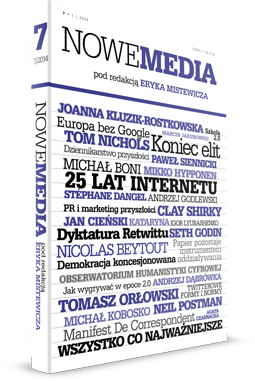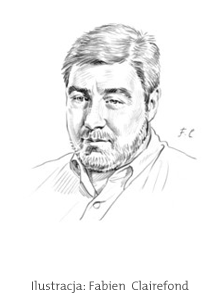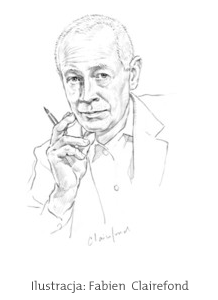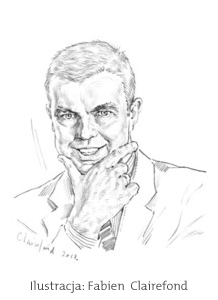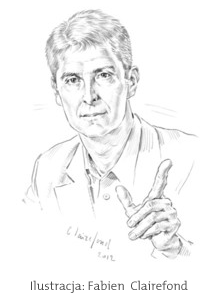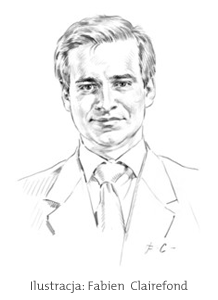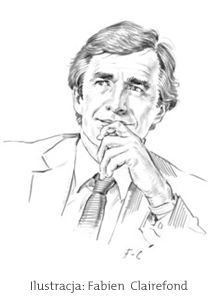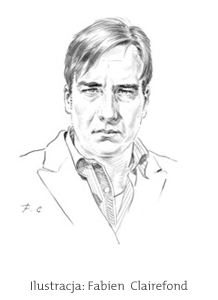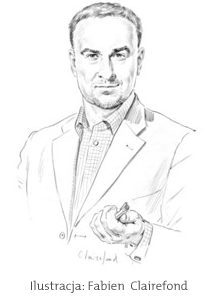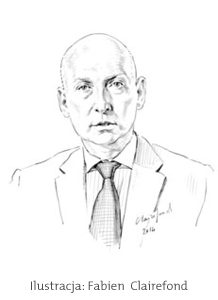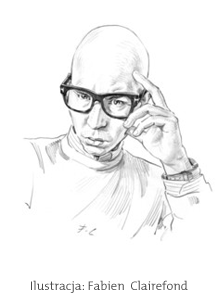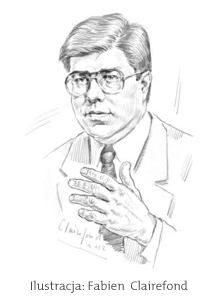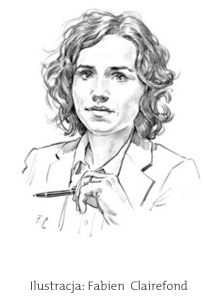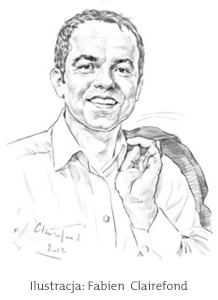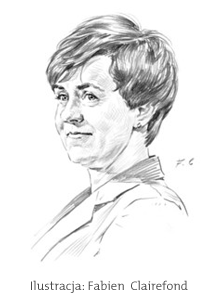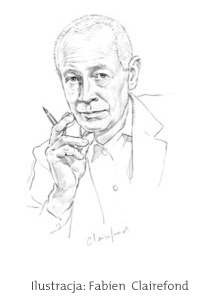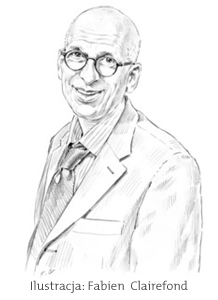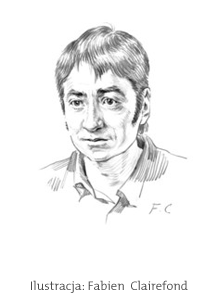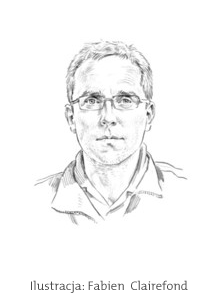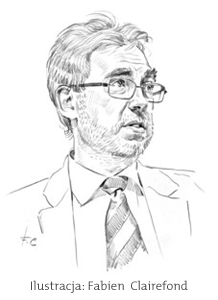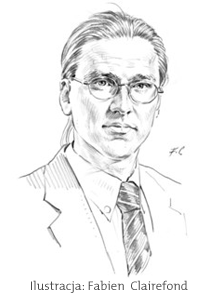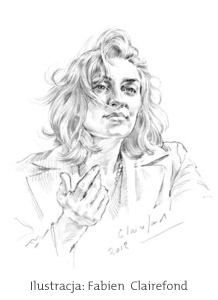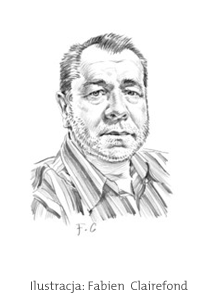Nowe Media nr 7
(7-1/2014)
Od początku „Nowe Media” animują dyskusję i debatę, organizują przestrzeń, łącząc i synergizując to, co najlepsi, wybrani Autorzy mogą wnieść do naszego wspólnego kapitału wiedzy. Uczestniczymy w seminariach i konferencjach świata nowych mediów, aby przenosić jak najwięcej wiedzy tam zdobywanej na polski grunt. Jednocześnie chcemy, nie tylko dzięki abstraktom w języku angielskim i francuskim, ale też tłumaczeniom wybranych tekstów i wymianie ich z naszymi partnerami zagranicznymi, aby nasi Autorzy jeszcze silniej uczestniczyli w międzynarodowym obiegu opinii.
Rekomenduję Państwu najlepszych Autorów, ważne i ważkie tezy, spojrzenie z wyprzedzeniem na problemy, które przed nami. Mądre stawianie najważniejszych, najbardziej istotnych pytań i poszukiwanie najlepszych odpowiedzi.
NOWE MEDIA ukazują się w wersji papierowej, tradycyjnej, oraz w wersjach cyfrowych.
Zapraszam do lektury.
wydanie papierowewydanie elektroniczne
Spis treści
Tom Nichols | Dominika Bychawska –Siniarska |
Michał Boni | Jean -Paul Oury |
Andrzej Godlewski | Clay Shirky |
Jan Cieński | Joanna Kluzik-Rostkowska |
Igor Lyubashenko | Michał Boni |
Nicolas Beytout | Seth Godin |
Paweł Siennicki | Stéphane Dangel |
DOKUMENT Manifest De Correspondent | Marcin Jakubowski |
Marek Twaróg | dr Tomasz R. Aleksandrowicz |
Michał Kobosko | Mikko Hypponen |
Tomasz Orłowski | Agata Czarnacka |
Wojciech Engelking | Prof. Andrzej Dąbrówka |
dr Jarosław Gdański | Dominika Bychawska –Siniarska |
Kataryna | dr Jarosław Gdański |
Agonia wiedzy. Koniec ekspertów. Śmierć elit, Tom NICHOLS
Profesor bezpieczeństwa narodowego w US Naval War College i adiunkt w Harvard Extension School. Ostatnio nakładem wydawnictwa University of Pennsylvania Press ukazała się jego najnowsza książka „No Use: Nuclear Weapons and U.S. National Security”
Błyskotliwy tekst o przyspieszeniu komunikacji, bezgranicznym i nie do końca rozumnym otwarciu się mediów, dewastacji autorytetów w świecie, w którym – jak mogłoby się wydawać – każdy wie to samo (wklepując szybciej lub wolniej tę samą kwestię do Google’a czy Wikipedii), każdy – czy to profesor, czy mistrz kuchni lub piłkarz – ma równe prawo uchodzić za eksperta od polityki, biotechnologii, lotów kosmicznych, dietetyki i zdrowia w świecie, w którym uczestnicy debaty publicznej nie odróżniają już frazy „mylisz się” od „jesteś głupi”. Intrygujący tekst!
ABSTRACT: There no longer exist a census once guaranteed by editor boards: newspapers and magazines that, not so long ago, were carefully edited, gave way under pressure of unbridled blogs. Some time ago a condition of taking part in a public debate, even on pages of a local newspaper, was to get published, and that required that a letter or an article presented a certain amount of intelligence, passed through editors’ critiques and appeared in print together with its author’s name. In those time being published meant something. Nowadays, everybody can publish; no limits to commenting articles on any given big title’s website. Sometimes it generates brainstorms that stimulate thought. More often, it means only that whoever wishes may publish whatever he sees fit, hiding under a nickname with no further pressure on defending his of her views in the future nor to stand up to criticism.
RESUME: Autrefois, éditeurs garantissaient une sorte de sélection; la presse, éditée avec soin, n’est plus – dû à la pression des blogs pétulants et sans limites. Il existait un période où participation au débat public était possible à condition d’avoir son article ou lettre publié; c’est à dire, de l’écrire avec une dose d’intelligence et d’esprit, de se résigner à la merci des éditeurs et de signer le texte avec son propre nom. Et même à ces conditions, se faire publier, c’était quelque chose! En revanche; aujourd’hui tout le monde peut publier ses commentaires sans limites sur de sites web des grands titres, ou pas si grands. Si de temps en temps ça peut résulter en un véritable brainstorming qui renforce et stimule la pensée, plus fréquemment, ce n’est que n’importe quoi, publié sous pseudonyme, ce qui n’entraine ni besoin de défendre sa position, ni nécessité de faire face à de ses critiques.
25 spraw na 25-lecie internetu, Michał BONI
Od listopada 2011 r. do listopada 2013 r. Minister Administracji i Cyfryzacji. Absolwent Uniwersytetu Warszawskiego. Działacz „Solidarności ”. W 1991 r. Minister Pracy i Polityki Socjalnej, w latach 1992–1993 Sekretarz Stanu odpowiedzialny m.in. za politykę rynku pracy. Poseł na sejm I kadencji. W styczniu 2009 r. powołany na Urzędy Ministra – członka Rady Ministrów. Od 2008 r. jest także szefem zespołu doradców strategicznych Prezesa Rady Ministrów. Wśród najważniejszych dokumentów autorstwa zespołu znajdują się: „Raport o kapitale intelektualnym Polski”, „Powrotnik. Nawigacja dla powracających” oraz „Raport Polska 2030. Wyzwania rozwojowe”
Próba odważnej diagnozy, gdzie jesteśmy, i postawienia tez, czasami radykalnych, dokąd zmierzamy, to przywilej wizjonerów. Wybranie z otaczającego nas świata sieci 25 najważniejszych kwestii dookreśla miejsce, w którym Internet, ale i nowe media znalazły się po ćwierć wieku. Zmuszający do myślenia, inspirujący w każdym z punktów tekst byłego ministra cyfryzacji, uważnego obserwatora i uczestnika najważniejszych spotkań wytyczających przyszłość świata 2.0.
Więcej analiz Michała Boniego na www.WszystkoCoNajwazniejsze.pl
ABSTRACT: It is a privilege of the visionaries to try giving diagnoses on where we are or to make sometimes radical stances as to where we are heading. To handpick 25 the most important issues pertaining the world around us help us determine the place where the Internet as well as now media got put after a quarter of a century. The text of Polish ex-minister of digitalization – also a thorough observer and a participant to the most important meetings to shape direction for the future and the world 2.0 – is thought-inciting and inspiring, paragraph by paragraph.
RESUME: Une diagnose courageuse de ce où l’on se trouve, tout comme nous présenter avec les thèses, parfois radicales, sur ce où l’on va : voilà le privilège des visionnaires. Un recueil de 25 questions les plus importantes pour le monde autour de nous va nous aider à mieux définir la place de l’Internet et des nouveaux médias après un quarte de siècle. Ce texte inspirant a été écrit par l’ex-ministre polonais de numérisation, un observateur diligent et participant des réunions les plus importantes ordonnant les directions pour le futur et pour le monde 2.0.
Wraca do mediów to co najważniejsze, Andrzej GODLEWSKI
Zastępca Dyrektora Programu 1 TVP S.A. Pracę w mediach elektronicznych rozpoczął w 1995 r., w latach 2004–2006 kierował redakcją publicystyki TVP1. Ma również duże doświadczenie prasowe – był m.in. Szefem działu Opinie "Dziennika" (2006–2007) oraz działów Opinie i Kraj w „Polska The Times” (2007–2010)
Cztery elementy cyfrowego świata, bez których trudno prowadzić jakąkolwiek dyskusję o nowych mediach. Michał Boni polską wizję rozwoju gospodarki 2.0 i przestrzeni cyfrowej przedstawił w trakcie konferencji w Seulu, w październiku 2013 r. W niniejszym, przygotowanym dla „Nowych Mediów” tekście wskazuje, jak oswajać otaczającą nas rzeczywistości w całej jej cyfrowej zmienności, wytycza bardzo wyraźnie rolę instytucji. Jednak przede wszystkim definiuje, co w czekającej nas zmianie, także w Polsce, jest najważniejsze. Przedstawia nam swoistą konstytucję czasu zmiany.
Więcej analiz Andrzeja Godlewskiego na www.WszystkoCoNajwazniejsze.pl
ABSTRACT: Ukrainian crise has finally brought forth what truly matters; also in the media this is what has become what’s most important. Freedom, peace, safety, justice – basic values have once again prevail in people’s minds all over Poland and Europe. Topics, once interesting only for think tank analysts, have started appearing in mainstream media. Meanwhile audience’s expectations towards big TV chains have risen and more and more spectators watch news services. In times of crises and world-changing events the TV becomes the main source of information for most Poles. Press content is comparable to information originating from family and friends. People interested in Ukraine’s events were almost three times more often turning towards the TV than online media.
RESUME: La crise d’Ukraine a pour conséquence ce que les choses fondamentales sont aussi redevenues les plus importantes. Les valeurs fondamentales comme la liberté, la paix, la sécurité ou la justice regagnent importance aux yeux de gens en Pologne comme en toute l’Europe. Les grands médias ont soudainement commencé à se concentrer aux sujets qui, une fois, n’ont préoccupé que d’analystes de think tanks. Au même temps attentes de la part de spectateurs se sont élevées et l’audience de services d’information s’accroît. Pour la plupart de Polonais la télévision est devenue le source principal d’information dans les temps de crise ou de grands événements. Information provenante de la presse se rapproche dans la perception commune à celle fournie par famille et par connaissances. Ceux intéressés à la situation en Ukraine se tournent vers la télé trois fois plus fréquemment qu’aux services en ligne.
Wojna narracji, Jan CIEŃSKI
Szef warszawskiego biura „Financial Times”. W 1989 i 1990 r. pracował w Warszawie dla United Press International . Od 2003 r. analizuje i relacjonuje najważniejsze wydarzenia w Polsce dla „Financial Times”. Wcześniej pracował w Waszyngtonie dla National Post i The Associated Press. Od 1992 do 1995 r. pracował dla niemieckiej agencji DPA w Moskwie, a także w Taszkiencie i Uzbekistanie. Pochodzi z RPA, absolwent stosunków międzynarodowych na Uniwersytecie w Toronto.
Joseph Nye sformułował regułę obowiązującą w szczególnym stopniu w nowej epoce wojen: wojny wygrywają nie armie, lecz historie. Oczywiście, tak było zawsze. Zawsze wojenna propaganda stanowiła oręż wpływający na postrzeganie placu boju, demobilizację przeciwnika, manipulację opinią publiczną świata. Dziś jednak, w epoce nowych mediów, mam wrażenie, że proces ten jest wyjątkowo silny. Poprosiłem Jana Cieńskiego, korespondenta „Financial Times”, o jego refleksję z placu propagandowej wojny, z Doniecka.
ABSTRACT: It was Joseph Nye who has established a rule, one of utmost pertinence in the new era of warfare: those are stories, not troops, that win wars. One can say, nothing new under the sun. War propaganda was used from the very beginning as a weapon in its own right, one to influence perception of battlefields, to demobilize enemies, to manipulate world’s opinion. It is my impression though that today, in the times of the new media, the process gains momentum. So I asked Jan Cienski – correspondent to the Financial Times – to give his reflections about the propaganda battlefield: Ukraine’s Donetsk.
RESUME: Joseph Nye a formulé une règle très pertinente dans notre époque belligérante : ce sont les histoires, pas les armées, qui remportent les guerres. Pas vraiment une nouvelle. Propagande de guerre a bien servi comme une arme d’influence de perception de ce qui se passe dans le champ de bataille, c’était un outil de démobilisation d’ennemi et surtout l’un de manipulation de l’opinion publique globale. Cependant, j’ai l’impression que notre époque de nouveaux médias a bien renforcé le processus. J’ai demandé à Jan Cienski, correspondent du Financial Times, de partager ses pensées au champ de bataille de propagande d’aujourd’hui : Donetsk en Ukraine.
Rewolucja w schematach komunikacji, Igor LYUBASHENKO
Politolog specjalizujący się w tematyce nowych mediów w Europie Wschodniej, a także polityce zewnętrznej UE, stosunkach międzynarodowych na obszarze Europy Środkowej i Wschodniej, procesach zachodzących w postsowieckich państwach Europy Wschodniej (w szczególności na Ukrainie i w Mołdawii). W 2010 r. obronił doktorat na Wydziale Politolog ii Uniwersytetu Marii Curie-Skłodowskiej
Jeśli nawet, jak przekonywał w 4 wydaniu „Nowych Mediów” Jan Maria Rokita, media społecznościowe nie zmieniają istoty polityki, Zuckerberg wciąż nie pokonuje Machiavellego, to kolejne wydarzenia, w których władza wyrywana jest z rąk nie poprzez demokratyczny proces, lecz z wykorzystaniem – także – sieci społecznościowych, smartfonów, Twittera, a coraz częściej również streamingu wideo, sprawia, że wraca pytanie o rolę nowych mediów we współczesnej polityce. Co wnosi do tej dyskusji ukraiński Euromaidan, o tym pisze dla nas Igor Lyubashenko.
Więcej analiz Igora Lyubashenki na www.wszystkoconajwazniejsze.pl
ABSTRACT: Social networks supported by social media have become new mainframe for contestation. They ensure quick mobilization of supporters in case of disturbing signals regarding planned force actions. This was the probable cause of Euromaidan’s longevity. No longer was present the need to maintain huge numbers of people on demonstration site. The essential role of social media in Euromaidan participants’ communications was confirmed by scientists from Oxford University. 49% among the participants received information about the protest through Facebook, 35% - through VKontakte (a Russian counterpart to Facebook), 51% found it on news portals, such as newly founded online television projects. Moreover, the research confirms that for the protesters, Facebook and news portals were more credible as information sources than traditional TV.
RESUME: Réseaux sociaux sont devenus, avec les médias sociaux, la nouvelle trame de protestation. Grâce à eux la mobilisation rapide des adhérents en cas où se font entendre de signaux inquiétants sur telle ou telle action de forces du régime planifiée. Probablement, c'est bien ça qui a contribué à la durée inédite d'Euromaïdan. Nul besoin de maintenir de groupes nombreux sur site de protestations. Rôle essentiel de médias sociaux dans le communications d'Euromaïdan a été confirmé scientifiquement par de visiteurs de l'Oxford University. 49% parmi les participants ont réçu information de l'action à travers Facebook ; 35% l'ont obtenu par Vkontakte, l'homologue russe du Facebook ; 51% l'ont cherché sur les services web, parmi lesquels de nouveaux projets de télévision en ligne. En plus, les recherches confirment que pour les manifestants, Facebook et sites web restaient plus crédibles en tant que sources d'information que la télévision traditionnelle.
To papier pozostaje instrumentem oddziaływania, Nicolas BEYTOUT
Dziennikarz i wydawca. Kierował redakcjami dziennika ekonomicznego „Les Echo s” i „Le Figaro”. Założyciel i szef prestiżowego francuskiego dziennika „L’Opinion ” – powstałego w 2013 r. tytułu łączącego od razu świat sieci i papieru.
O tym eksperymencie mówi dziś cała Europa: nowe pismo opinii, nomen omen „L’Opinion”, powstało w Paryżu. Poprosiłem szefa tej gazety o jego wizję pism opinii w przyszłości powstałą na podstawie kilkumiesięcznego doświadczenia z tworzenia „L’Opinion”. To, co wydaje mi się dziś najważniejsze, to próba budowania nowych mediów od początku, „na zaoranej ziemi”, z połączeniem tego, co najlepsze w świecie 1.0 i 2.0. Jakżeistotne jest też zdanie: „Nie gonimy za czytelnikami. Chcemy zbudować silną markę i sprzedawać profesjonalne informacje”.
ABSTRACT: 'L’Opinion’, after nine months of existence, has inscribed itself well in French media paysage. Each and every day it is being quoted by radio and TV stations. We hold an uncontested position among opinion leaders. Not so long ago, we performed an inquiry that showed that 76% among them are familiar with ‘L’Opinion’. More than a third of the opinion leaders deem our influence as ‘significant’; half of them is persuaded that our influence will rise in time. 'L'Opinion' has found its place in the market and its readers. All indicators are positive. Within next three years, we want to have a million visitors to our website and 50 thousand sold copies. We do not chase for readers though. We want to build a strong brand and sell professional information.
RESUME: L'Opinion semble bien établi dans le paysage médiatique de France, après seulement neuf mois d'existence. Chaque jour il est cité dans la télé ou par telle ou telle station de la radio. Nous avons une position incontestée chez les leaders d'opinion. Il y a peu, on a conduit une recherche qui a montré que 76% parmi eux connaissent L'Opinion et que plus qu'un tiers d'eux reconnaissent notre influence comme significative. Une moitié d'eux est persuadée que notre influence va s'accroître. Donc, L'Opinion a trouvé sa place dans le marché et son audience. Tous les indicateurs sont positifs. Dans trois ans nous espérons avoir un million de visiteurs de notre site avec la vente de 50 mille exemplaires. Néanmoins nous ne chassons notre audience. Notre ambition, c'est d'établir une marque forte et de vendre d'information professionnelle.
Nie zginiemy - czyli medialne Jujitsu, Paweł SIENNICKI
Redaktor naczelny „Polski the Times”. Wcześniej pracował m.in. dla „Newsweeka”, „Wprost”, „Rzeczpospolitej”, TVN24, „Nowego Państwa ”. W 2006 r. nominowany do Grand Press. W 2010 r. razem z Anitą Werner otrzymał statuetkę InicjaTOR w plebiscycie MediaTory. Współautor książek „Towarzystwo Lwa Rywina ” (z Bogdanem Rymanowskim) oraz „Dwa ognie” (z Anitą Werner). Absolwent UW oraz Wajda School. Obecnie przygotowuje swój fabularny debiut.
„Oto nadchodzą hipsterscy konsumenci informacji, którzy odrzucają ten model, mówiąc wytwórcom takich treści: robicie obciach, wasza darmocha jest nic niewarta” – pisze szef „Polski the Times”, wieszcząc powrót do prawdziwego dziennikarstwa, do wartościowych informacji i opinii. A może do przetransferowania s a v o i r- f a i r e z epoki przedinternetowej. A może do świata wartości i idei, któremu niegdyś dziennikarstwo było oddane. Kiedy się to skończyło i co dalej – oto wizja Pawła Siennickiego.
ABSTRACT: On the market we do media jujitsu. We take over the energy of our opponent’s, our own weakness turning into an advantage. Only us, the independent journalists, will offer no media salvage, no crap you can find everywhere and for free. I won’t even write ‘unfortunately’: you will simply have to pay. Just as you do not expect to get a good lunch for free. For those who want free food, there awaits a lady with promotion stand, somewhere among supermarket stalls… Well, choose by yourselves.
RESUME: C'est du véritable ju-jitsu médiatique qu'on fait dans le marché : on reprend l'énergie de notre adversaire, on tourne ses propres faiblesses en atouts. Il n'y a que nous, journalistes indépendants, à vous offrir contenu qui ne soit du boue omniprésent et gratuit. Parce-qu'il faut payer et je n'e vais même pas écrire „malheureusement”. C'est la même chose qu'avec un bon lunch, il doit coûter. Pour ceux qui cherchent le gratuit il y a une mademoiselle au supermarché qui s'occupe de promos. A vous de choisir...
Dokument Manifest De Correspondent
To jeden z najbardziej ożywczych dziś projektów medialnych w Europie. Holenderski De Correspondent zdobył w zbiórce publicznej, w sieci, 1,7 mln dolarów i 28 tys. abonentów. Sercem kampanii crowdfundingowej był dokument założycielski – rodzaj manifestu określającego dziesięć fundamentalnych zasad, wokół których zorganizowany został projekt nowego dziennika De Correspondent. Dokument warty uwagi.
ABSTRACT: One of the most invigorating media projects in today’s Europe. Dutch ‘De Correspondent’ has acquired, through internet public fundraising, 1.7 million US dollars and 28 thousand subscribers. At the heart of its crowdfunding campaign was its founding chart, a manifesto of sorts that specified ten basic rules around which the new daily, ‘De Correspondent’, was organized.\
RESUME: Un de projets médiatiques les plus vivifiants en Europe de nos jours. De Correspondent hollandais a collecté 1,7 million de dollars et gagné 28 mille abonnés à travers une collecte publique en ligne. Au coeur de la campagne se trouvait un document de fondation très particulier, sorte de manifeste, établissant 10 règles de base autour desquels s'organise ce journal tout neuf surnommé De Correspondent.
Pokochaj ich. O budowaniu relacji z czytelnikami, Marek TWARÓG
Redaktor naczelny „Dziennika Zachodniego ”, wcześniej trzy lata kierowa ł „Gazetą Wrocławską”. Jeszcze wcześniej był reporterem zajmującym się Kościołem, Unią Europejską i śląskim regionalizmem. Absolwent Uniwersytetu Śląskiego . Współautor z Arkadiuszem Golą reporterskiego albumu „Ludzie z węgla ”.
„Dziennik Zachodni” to jeden z najciekawszych dziś w Polsce konceptów redakcyjnych współpracy świata 1.0 ze światem 2.0, czerpania z tradycji dobrego dziennikarstwa i siły oddziaływania nowych mediów, wreszcie angażowania Czytelników. Poprosiłem jego szefa o jego receptę na prowadzenie dużego tytułu prasowego w epoce nowych mediów. Swoisty dekalog.
ABSTRACT: Juxtaposing internet and paper can affect establishing a brand as well as good relations with Readers. We are talking the very same juxtaposition that was imposed on us by our ambitions, by business, by people we entertain. The very same juxtaposition one can feel within editing boards where ‘youngsters’ and ‘oldboys’ are rarely getting along. ‘Dziennik Zachodni’, on the contrary, is one and the same both in paper and online. And the Reader must feel it. His or her letters they carefully wrote by hand and sent at a post office must be used in the online edition as well. His or her children or grandchildren will certainly tell them they ‘have made it’ in the Internet. The same is true regarding opinions and comments from the website - no hesitation as to whether to put them in print. Somebody's mom or gradnma will certainly celebrate her progeny’s success as an opinion writer.
RESUME: Une opposition féroce du papier et de l'internet peut nuire à l'établissement d'une marque tout comme aux relations avec Lecteurs. Cette opposition n'est pas autre que celle que nous ont imposé nos ambitions, le business ou nos connaissances. La même opposition peut on distinguer dans les rédactions où les jeunes et les vieux ne s’entendent pas vraiment bien. Contrairement, le Dziennik Zachodni est le même en papier qu'en ligne. Et notre Lecteur doit le sentir. Quand il nous envoie depuis une bureau de poste une lettre écrite à main, on va utiliser cette lettre aussi dans notre édition numérique. Ses enfants ou grand-enfants vont lui dire qu'il ou elle a été publié(e) sur l'Internet. Parallèlement, les commentaires et opinions du site web doivent paraître sur le papier. La mère ou la grand-mère de l'auteur va se réjouir d'un succès pareil de son enfant en tant qu'écrivain...
Jakoś już jest - czas na jakość, Michał KOBOSKO
Redaktor naczelny Project Syndicate Polska, Fundacja Świat Idei i szef polskiego oddziału waszyngtońskiego think-tanku Atlantic Council. Od 1993 r. dziennikarz giełdowy i finansowy „Gazety Wyborczej”. W latach 1997–2003 zastępca redaktora naczelnego „PB”. Od 2005 r. kierował polską edycją „Forbes”. Od 2006 r. redaktor naczelny „Newsweek Polska”. W 2009 r. przeprowadził fuzję zespołów redakcyjnych i tytułów „Dziennik Polska Europa Świat ” oraz „Gazeta Prawna ”, zostając redaktorem naczelnym „Dziennika Gazety Prawnej”. Od 2011 r. w Platformie Mediowej Point -Group, jako redaktor naczelny polskiej edycji „Bloomberg Businessweek Pol ska”, od lutego 2012 r. redaktor naczelny „Wprost".
Michał Kobosko osiągnął maksimum tego, co było do osiągnięcia w mediach tradycyjnych. Dziś tworzy wysokojakościowe niszowe portale opinii, dyskusji, debaty. Poprosiłem, aby napisał o wartości informacji, która nie umiera mimo głębokiej zmiany przechodzącej dziś przez dziennikarstwo i media. Na pewno kierunek nazywany przez Michała Kobosko Nowymi Wysokojakościowymi Mediami – warty jest szczególnej uwagi.
ABSTRACT: As we are getting fed up with the New Information Reality - and we get fed up with it quicker than it took to establish it - we start desperately seeking for more solid base. We seek for wider contexts, for opinions of experts capable to shed more light and reach deeper within the subject and take no refuge in professional jargon… People feel lost and gradually helpless as they fight information swamp. Haphazardly, they zip and zap, as they loose time and life altogether. All the more welcoming we are towards projects that slowly and with no big fuss enter Polish market. New Quality Media (NQM) are not nor will not be a mass product. They don’t have to be. On the contrary, they seek and reach those assorted groups of people who know exactly what they need. You may call it ‘positive snobism’ or, simply, growing intellectual aspirations within society that has for past 25 years gotten to know better both freedom and capitalism.
RESUME: Au fur et à mesure que la Réalité Nouvelle d'Information nous fatigue – elle nous fatigue plus rapidement qu'il fallait à l'imposer – nous commençons à nous chercher une base plus solide et des contextes plus panoramiques. Nous nous apprenons à apprécier opinions des experts capables a éclaircir et approfondir les sujets abordés, qui n'ont pas besoin du jargon professionnel. Les gens se trouvent défaits dans son combat quotidien contre de marécages d'information. Tant plus vont-ils apprécier de nouveaux projets qui graduellement et sans bruit gagnent le marché en Pologne. Ce sont les Médias de Qualité Nouvelle (MQN) qui ne sont pas, ni ne vont pas être destinés aux masses. Au contraire, ils s'adressent au public assorti, aux gens qui savent bien ce dont ils ont besoin. On peut nommer la tendance « le snobisme positif » mais peut-être ce sont, tout simplement, les aspirations intellectuelles qui grandissent dans la société ayant connu 25 années de liberté et de capitalisme.
Twitterowe formy i normy, Tomasz ORŁOWSKI
Historyk, dyplomata , nauczyciel akademicki. Ambasador RP we Francji. Pracuj e w MSZ od 1990 r. na placówkach (Paryż, Rzym) oraz na stanowiskach kierowniczych w Central i MSZ (ostatnio dyrektor Protokołu Dyplomatycznego).
Ambasadora Tomasza Orłowskiego poprosiłem o analizę Twittera z punktu widzenia znawcy formy, ale i praktyka komunikacji z użyciem nowych mediów. Konto Ambasady Rzeczpospolitej Polskiej w Paryżu prowadzone na Twitterze to bowiem jedno z najlepszych kont polskiej administracji w tym serwisie i wzorcowe wręcz konto polskiej placówki dyplomatycznej w nowych mediach. Zarówno pod względem dopracowania treści, jak i formy przekazu.
ABSTRACT: We should never forget that new media are just a tool, a useful one if, and only if we are able to wield it well. Such a tool by no means cancels forms and obligations due in less new but more trusted, well seasoned communication forms. Rush and pressure are no excuse for intellectual laziness, lack of forms, unreliability. Information revolution influences ways we proceed in traditional diplomacy; however, it poses no threat to it. Information is to a diplomat but a rough material. A true surplus value is his or her ability to use the information to establish connections, dialogue and trust. All that requires more than even the best-managed Twitter account, than even a thousand of retweets.
RESUME: In ne faut jamais oublier que les nouveaux médias ne sont qu’un outil, utile seulement si on est capable de s’en servir. Dans aucun cas cet outil ne nous décharge pas de devoir de se conformer aux formes et normes propres à de chaînes de communication peut-être pas si neuves mais plus réputés. Précipitation et pression ne justifient jamais la paresse intellectuelle, manque de culture ou de solidité. La révolution d’information peut influencer les modes de diplomatie traditionnelles, néanmoins elle ne porte aucun menace envers elle. Pour un diplomate l’information n’est que de la matière première. La valeur ajoutée véritable c’est sa capacité de la transformer en connexions établies, en dialogue, en confiance. Ce qui ne serait jamais atteint par un compte Twitter, si bien mené qu’il ne soit, ni par une mille des retweets.
Instagram kiczu. Instagram zbrodni, Wojciech ENGELKING
Stypendysta Ministra Nauki i Szkolnictwa Wyższego studiujący w Kolegium Międzywydziałowych Indywidualnych Studiów Humanistycznych na Uniwersytecie Warszawskim. Publikował w „Do Rzeczy” i „Tygodniku Powszechnym”. Jesienią 2014 r. w wydawnictwie Świat Książki ukaże się jego powieść „(niepotrzebne skreślić)”.
Młodzi ludzie swoje zdjęcia w miejscach kaźni, w obozach koncentracyjnych publikują na Instagramie i opatrują niewyszukanymi komentarzami. Gdy pierwszy raz o tym usłyszałem, pomyślałem, że mówimy o marginesie. Wojciech Engelking opisał przerażającą twarz nowych mediów, a może po prostu niczym niezatrzymywaną ekspansję kiczu wśród technologicznych zachwytów. Ważny tekst, polecam.
Więcej analiz Wojciecha Engelkinga na www.WszystkoCoNajwazniejsze.pl
ABSTRACT: Young people publish on Instagram. They upload their pictures from sites of martyrdom, selfies taken in concentration camps. They supply vulgar comments. Wojciech Engelking describes the scary face of new media. Or, perhaps, just the unstoppable expansion of kitsch that takes place among technological awes. What kitsch and entertainment have in common is that, lacking ethical founding, they can serve each and any ideology, the one that is stupidly disinterested just as well as the one that is deadly.
RESUME:Jeunes gens publient sur l’Instagram ses photos prises dans les sites de massacres ou dans les camps de concentration en ajoutant de commentaires inappropriés. Wojciech Engelking décrit le visage effrayant des nouveaux médias qui est aussi celle d’une expansion incontrôlable du kitch accompagnée par l’enthousiasme technologique. Le kitch et le divertissement sont pareillement dépourvus d’éthique quelconque et comme tels ils sont prêts à servir n’importe quelle idéologie. Une qui est stupide et indifférente aussi bien qu’une qui est tout simplement meurtrière.
Nauka PR-u; mediów; marketingu – jak; kogo; po co?, dr Jarosław GDAŃSKI
Wieloletni wykładowca i praktyk PR pracujący w prywatnym biznesie edukacyjnym w Polsce, były strateg wyborczy w wyborach parlamentarnych jednego z wiodących ugrupowań politycznych.
Jak uczyć dziś dziennikarstwa, marketingu, public relations, komunikacji społecznej, nowych mediów? Powszechna jest dziś krytyka nauczania na tych kierunkach, powszechne są narzekania. Czy słusznie? Tę dyskusję animujemy od pierwszego wydania „Nowych Mediów”. Dziś głos kolejnego praktyka, wykładowcy akademickiego. Zapraszamy do lektury, dyskusji, polemiki.
ABSTRACT: The last decade has seen hundreds of PR-graduates leave their alma maters of all sorts and levels. A certain overproduction of PR-specialists has taken place, analogous to what happens in other professions. American approach to PR was predominant with not even a hint about achievements of the Europeans. German, French, much less Russian exploits - however by sheer geography should the last be close to our hearts - in the area would certainly enrich our knowledge and ability to wield instruments and techniques of Public Relations. What helped immeasurably to americanize the Polish PR education was the multitude of readers and handbooks translated from American-English. Much as they were inadequate to European, and hence Polish, reality, they were often obsolete regarding techniques and strategies forced upon the students.
RESUME: Au cours de la décennie dernière, chaque année des centaines des diplômés de PR ont quitté les murs des écoles de tous les niveaux et de tous les types. S’est crée une situation semblable à des autres facultés : celle d’une certaine surproduction des agents de PR. Le champ est prédominé par de standards américains, sans aucune référence aux succès atteints en Europe. Connaître ce qui est accompli en Allemagne, en France ou même en Russie - donc en cultures plus proches à la nôtre n’est ce que géographiquement - pourraient enrichir notre savoir-faire des instruments et des techniques de PR. Américanisation des études PR en Pologne a été facilité par la multitude de traductions des livres parus sur le marché américain. Livres pas seulement inadaptés aux réalités européennes, et donc polonaises, mais aussi, parfois, drastiquement arriérés en matière de techniques ou stratégies présentées aux étudiants.
26 stycznia 1984. Takie prawo prasowe, KATARYNA
Rozpoczynamy dyskusję o zmianie Prawa prasowego. Czy jest w ogóle potrzebne, a jeśli tak, to jakie – biorąc pod uwagę dokonującą się zmianę w mediach. Kto jest dziś dziennikarzem, jakim obowiązkom powinien podlegać, jakie ma prawa. Jak regulowana powinna być działalność „prasowa” w sieci, o ile w ogóle. Co wreszcie w epoce nowych mediów jest prasą, co wydawnictwem, co redakcją. Zacznijmy od definicji – proponuje Kataryna, najbardziej znana polska blogerka. Zapraszam do dyskusji.
ABSTRACT: The current Polish Press Code entered in vigor in 1984 r. Today it serves Polish politicians as a basis to regulate what happens online. Meanwhile everything has changed. Let’s begin our discussion by defining who nowadays is a journalist, what his or her obligations and rights are. How we should regulate „press activities“ online - if such regulation is indeed in order. Finally, what in the era if new media press is and what it isn’t. What is a publishing house and what is an editing board?
RESUME: Loi sur la Presse qui est en vigueur en Pologne a été promulguée en 1984. Elle sert comme base pour le monde politique d’aujourd’hui qui veut régler ce qui se passe en ligne. Entre temps tout a changé. Nous devons commencer notre discussion par ce qui est aujourd’hui un journaliste, quelles sont leur obligations et leur droits. Par ce comment régler l’activité dite de presse sur l’Internet ou même - si une tel règlement est vraiment nécessaire. Finalement il faut bien définir ce qui est la presse, la maison d’édition et la rédaction d’époque des nouveaux médias.
Odpowiedzialny pośrednik. O języku nienawiści z prawnego punktu widzenia, Dominika BYCHAWSKA –SINIARSKA
Prawniczka, absolwentka Kolegium Europejskiego w Natolinie. Pracowała w kancelarii Europejskiego Trybunału Praw Człowieka. Od 2008 r. szefowa „Obserwatorium wolności mediów w Polsce” Helsińskiej Fundacji Praw Człowieka. Członek Panelu Doradczego Agencji Praw Podstawowych Unii Europejskiej. Odznaczona dziennikarską nagrodą „Artykułu 54 Konstytucji RP” za zasługi na rzecz wolności słowa w Polsce.
„Problem odpowiedzialności pośredników, dostawców i właścicieli portali internetowych za treści można przyrównać do słupa ogłoszeń, do którego mieszkańcy mogą przyczepiać drobne ogłoszenia. Kto powinien odpowiadać za umieszczane przez nich informacje – właściciel słupa ogłoszeniowego czy też mieszkaniec, który przykleja do niego notkę?” Jeśli apele o dojrzałość, odpowiedzialność, kulturę nie skutkują, pojawia się pole do działania dla prawników. Szczególnie gdy właściciel strony czy platformy informacyjnej zarabia na publikowanych tam treściach, np. plasując reklamę. Odpowiedzialny staje się więc także za moderowanie poziomu prowadzonej tam dyskusji.
Więcej analiz Dominiki Bychawskiej-Siniarskiej na www.WszystkoCoNajwazniejsze.pl
ABSTRACT: European Court of Human Rights has clear logic: if providers make earnings on user-generated content then they are also responsable for it. This establishes a new standard and shifts the burden of responsibility and care for the content on providers. One can expect it especially when it comes to hate speech which, in light of ECHR decisions, is a basis to interfere with the freedom of speech. In relation to aforementioned decision, portals and websites that subsist on hate-speech promotion may have difficulties justifying their existence. Others should give more attention to illegal content.
RESUME: La logique du Tribunal Européen des Droits de l’Homme est claire : si fournisseurs profitent du contenu généré par les usagers ils sont aussi ceux en responsables. Le nouveau standard est établi d’après lequel le poids de responsabilité et le soin de contenu reste sur les fournisseurs. Le soin bien plus attendu là où il s’agit du hate speech que les décisions du Tribunal ont déclaré comme base pour interférer à la liberté d’expression. En lumière dudit verdict les sites qui s’entretiennent par promouvoir le hate speech peuvent avoir de problèmes.
Google; Twitter; Apple nie mogłyby powstać w Europie, Jean -Paul OURY
Jeden z czołowych francuskich ekspertów w za kresie wizerunku publicznego w sieciach społecznościowych . Dyrektor regionalny ds. Europy Wschodniej i rozwoju biznesu JIN. Jego specjalizacja to zarządzanie kryzysem reputacji w sieci. Współpracuje z Instytutem Nowych Mediów w projektach realizowanych w Europie Centralnej.
Dlaczego nie mogłyby powstać w Europie Google, Twitter, Apple? Przecież jeszcze niedawno Francja na kilka dziesięcioleci przed erą Internetu zaproponowała w masowym użyciu Minitel. Dziś jednak biurokracja, pomoc publiczna, marnotrawienie środków krajowych czy – jak w polskim przypadku: europejskich – pokazują, jakie błędy popełniamy w Europie. I, jak przypomina Jean-Paul Oury, w 1984 r. Steve Jobs zapytał prezydenta Mitterranda, gdy ten był z wizytą w Dolinie Krzemowej, o ciężary administracyjne panujące we Francji. Warto dziś więc zapytać, czego nasi, europejscy politycy nauczyli się od tamtej pory.
ABSTRACT: Once again, the same diagnosis. Even when it is about supporting the entrepreneurs, the state’s actions appear counterproductive: what begins as help draws the companies away from the market, the funds are distributed not in the ways they should be. Conclusion is therefore simple: why don’t we allow to live the true entrepreneurs, those who are innovative? Why we don’t stop at ensuring they have freedom to develop? Why don’t we just trust them with no expectations in return? In 1984, Steve Jobs asked president Mitterand as the latter visited Silicon Valley - what were administrative burdens in France. Let’s pose another question: what have politicians learned since? France is symptomatic, an extreme case in Europe. Colbertism is thoroughly unadapted to innovation culture. No doubt though that such lesson shall better be learned by other European Union countries.
RESUME: Toujours le même diagnostic. Même là où il s'agit de soutien pour des entrepreneurs, l'Etat reste contre-opératif. Ce qui commence en tant qu'aide finit par distraire les firmes du marché. Les fonds ne sont pas distribués comme il le fallait. La conclusion est toute simple : pourquoi ne pas laisser faire les entrepreneurs innovants, les vrais ? Pourquoi ne pas s'arrêter, en ne leur donner que la liberté de se développer ? Pourquoi ne pas leur faire confiance sans rien attendre d'eux ? En 1984, Steve Jobs a demandé à François Mitterand, quand ceci visitait le Silicon Valley, quelles sont les charges administratives en France. Aujourd'hui, on peut poser une autre question : qu'est-ce que les politiciens ont appris pendant ces trois décades ? France est spéciale, un cas extrême de l'Europe, le colbertisme étant totalement inadapté à la culture d'innovation. En revanche, autres pays-membres de l'Union Européenne profitaient-ils de son tour d'avoir fait ses devoirs.
Szkolnictwo wyższe epoki nowych mediów, Clay SHIRKY
Jeden z najwybitniejszych amerykańskich konsultantów nowych mediów. Wykładowca i pisarz. Specjalizuje się w tematyce wpływu sieci technologii na sieć relacji międzyludzkich, skutków społecznych i gospodarczych nowych mediów. Pisze w „New York Times”, „The Wall Street Journal ”, „Harvard Business Review” i „Wired”.
System edukacji przeżył gospodarkę, której już nie ma. Przeżył te potrzeby, jakie generowała. Dziś edukacja wyższa w Stanach Zjednoczonych pogubiła się tak, jak gubi się w innych miejscach globu, w tym w Europie, w Polsce. W poszukiwaniach najlepszych, najgłośniejszych, najważniejszych tekstów o tym, jak powinna wyglądać wyższa edukacja w epoce nowych mediów, sięgamy po autora niezwykłego: Claya Shirky’ego.
ABSTRACT: In traditional academia we can contribute to creating the future. In order to do so, we must however stop concentrating on elite students, institutes and faculties; we need to stop perceiving ourselves as irreplaceable actors to play sacred roles and look at ourselves as people holding functions that are necessary to our societies. Functions of which one and one only consists of creating knowledge. It will require from us to abandon all hopes of restoring the Golden Age. It was an agreeable and yet unstable time: it lasted and passed, it will not come back. Since it expired, there already passed 10 more years than it „lived“. We did more harm to our institutions, our students, our younger colleagues by trying to revive it than we would have done by searching to adapt to new conditions. Arguing that we have to resuscitate the system in place as we need to acquire subsidies the world owes us is, as a matter of fact, a good way to preserve the set-up that privileges elites, opulent institutions, tenure-holders and rich students, and harms everybody else in the process.
RESUME: L’académie traditionnelle peut faire part en création de l’avenir. Quand même, pour faire ça, nous devons céder à obséder des étudiants, des institutions, des facultés élitaires. Nous devons arrêter de nous vouloir les acteurs indispensables jouant les rôles sacrés et nous regarder comme les gens responsables de certaines fonctions dont notre société a besoin, parmi lesquelles se trouve celle, une par,i autres, de créer le savoir. Pour le faire nous serons obligés de perdre nos illusions de restaurer notre Âge d’or. C’était le temps très agréable qui se révélait instable / ile se déroulait, il s’est fini, il ne reviendra pas. Depuis sa fin, il passait dix ans de plus qu’il durait. En essayant de le restaurer nous avons endommagé nos institutions; nos étudiants; nos jeunes collègues plus qu’il y demanderait de nous adapter aux conditions nouvelles. Raisonnement d’après lequel nous devons soutenir l’ordre existant jusqu’à ce que nous obtiendrons les subventions que le monde nous doit ne mène qu’à conserver le système où élites privilégiées, étudiants riches, institutions qui sont à l’aise et les professeurs titulaires fleurissent mais où le reste du monde reste desservi.
Najważniejszy jest nauczyciel, Joanna KLUZIK-ROSTKOWSKA
Minister Edukacji Narodowej
Tablet, smartfon, laptop, tablica multimedialna, komputer na każdej ławce i w każdym tornistrze? Nie. Świat spróbował tych dróg i spasował. Wciąż najważniejszy jest nauczyciel. Cyfryzacja szkoły, wprowadzanie nowych mediów nie może naruszać najważniejszej w dobrej edukacji relacji, relacji nauczyciel – uczeń, lub, jak należałoby raczej powiedzieć: Mistrz – uczeń. O tym bardzo zasadniczy i wytyczający kierunki tekst Joanny Kluzik-Rostkowskiej, Minister Edukacji Narodowej.
ABSTRACT: A tablet, a smartphone, a multimedia board, a computer on each desk, in each backpack? No. All around the world those paths were tried and abandoned. It is still the teacher who counts the most. Digitalization of the school, introduction of the ne media must not interfere with the most important relationship, one between a teacher and a student, or rather: between a master and a student. As writes in her fundamental text the Polish minister of education Joanna Kluzik-Rostkowska, indicating new directions for the country’s schooling.
RESUME: Une tablette, un smartphone, une table multimédia, un ordinateur sur chaque banc - le monde a tout essayé et a décidé contre. Toujours c’est l’enseignant qui compte. Numérisation de l’école ou introduction des nouveaux médias doivent surtout maintenir la relation la plus importante pour une bonne éducation, celle entre l’enseignant et l’élève ou, plutôt, entre le maître et son disciple. Joanna Kluzik-Rostkowska, la ministre polonaise de l’éducation nationale nous offre de nouvelles directions dans son texte fondamental.
Edukacja w cyfrowej transformacji, Michał BONI
Od listopada 2011 r. do listopada 2013 r. Minister Administracji i Cyfryzacji. Absolwent Uniwersytetu Warszawskiego. Działacz „Solidarności ”. W 1991 r. Minister Pracy i Polityki Socjalnej, w latach 1992–1993 Sekretarz Stanu odpowiedzialny m.in. za politykę rynku pracy. Poseł na sejm I kadencji. W styczniu 2009 r. powołany na Urzędy Ministra – członka Rady Ministrów. Od 2008 r. jest także szefem zespołu doradców strategicznych Prezesa Rady Ministrów. Wśród najważniejszych dokumentów autorstwa zespołu znajdują się: „Raport o kapitale intelektualnym Polski”, „Powrotnik. Nawigacja dla powracających” oraz „Raport Polska 2030. Wyzwania rozwojowe”
Kluczem do sukcesu w gospodarce przyszłości jest edukacja. Jak jednak wyjść poza oczywistości, truizmy i nie wpaść w pułapkę rozwiązań technologicznych oferowanych przez koncerny, które najchętniej nasyciłyby proces edukacyjny gadżetami, tabletami, laptopami, zaburzając odwieczną podstawę dobrej edukacji: relację mistrz – uczeń? Niewiele jest osób, które potrafiłyby zaproponować autorską wizję. Wśród Polaków na pewno jest to Michał Boni.
Więcej analiz Michała Boniego na www.WszystkoCoNajwazniejsze.pl
ABSTRACT: The key to changing economy as ‘share economy’ of sorts (we observe growing tendance of such patterns) is ability to cooperate that students should learn as early as in school. It requires different methodologies of teaching, different disposition of space destined for students: schools, classes, desks/tables arrangements. Teachers change their role. Their basic task which is to generate students’ individual abilities is supplemented by building their openness towards collaboration. New technologies increase personalization of the teaching process but they also enable collective completing of certain tasks.
RESUME:La clé aux changements économiques, à la ‘share economy’ (dont la tendance intensifiée est visible) c’est la capacité de collaboration. Elèves doivent l’acquérir déjà en école mais ça demande la méthodologie différente de l’enseignement, autres dispositions d’espaces destinés aux écoliers : à commencer par l’école et la salle de classe pour en finir avec l’arrangements des bancs et/ou tables. Le rôle de l’enseignant change. Son tâche principal : générer capacités individuelles chez élèves se complète par un autre : les faire susceptible aux bénéfices de collaboration. Technologies nouvelles permettent à personnaliser le processus d’enseignement. En même temps elles facilitent l’achèvement collectif de certains tâches.
Marketing za przyzwoleniem, Seth GODIN
Uznawany za Jednego z największych innowatorów świata marketingu. Autor konceptu Permission Marketing . Ka żda z jego książek staj e się natychmiast światowym bestsellerem. W Polsce ukazała się ostatnio „Potrząśnij pudełkiem, czyli mała książka dla wielkich ludzi” (Helion, 2012). Ostatnio w Polsce ukazały się jego „Wszyscy jesteśmy dziwni. O micie masowości i końcu posłuszeństwa ” (Helion, 2013) oraz „Marketing za przyzwoleniem. Jak zmienić obcych ludzi w znajomych, a znajomych w klientów” (Helion, 2014).
Bardzo rzadko zdarzają się tak porywające koncepty, bardzo niewielu jest takich autorów jak Seth Godin – idących pod prąd, fenomenalnie wyczuwających kres przestarzałych idei, na których opierają się całe linie strategii i taktyki setek tysięcy „specjalistów od marketingu” powielających coś, co przecież już nie działa. Wielka krytyka masowego marketingu opartego na wpychaniu informacji, produktów, usług, „marketingu przeszkadzającego” jest trafna. To, co proponuje Seth, „marketing za przyzwoleniem” w epoce nowych mediów za chwilę już stanie się oczywistością.
ABSTRACT: Rarely one encounters a concept so fetching. Few there are authors comparable to Seth Goldin. He goes against the current, bravely recognizing when an obsolete idea starts to rot, an idea the entire strategies and tactics were built upon by hundreds of thousands of ‘marketing specialists’, eager to repeat what once worked but no longer does. How pertinent is his overwhelming critique of mass marketing based on pushing in of the information, the products, the services, the ‘marketing of disturbance’. The ‘marketing upon acceptance’ as proposed by Seth, in the era of new media, will become a new normal in a matter of days.
RESUME: On rencontre rarement de concepts tellement entraînants. Très peu il y en a d’auteurs à comparer à Seth Goldin - toujours à contre-courant, percevant sans faille la fin des idées obsolètes sur lesquelles reposent toujours lignes stratégiques ou tactiques de centaines de milliers de « spécialistes du marketing ». Eux, ils sont prônes à répéter ce qui a une fois marché même s’il ne marché plus. Critique massive du « push marketing » destiné aux masses auxquelles on renforce les informations, produits ou services est juste. Au contraire, Seth nous propose le « marketing de confirmation », ce qui va devenir évident dans l’époque des nouveaux médias.
Porażka racjonalizmu, Stéphane DANGEL
Konsultant i trener w zakresie marketingu narracyjnego. Autor kilku książek. Najnowsza – „Storytelling Minute” została wydana nakładem wydawnictwa Eyrolles w styczniu 2014 r.
Siła narracji pozwala przenosić góry: zwracać uwagę na nasze projekty, opowiadać produkty i usługi, budować wizerunek firm, instytucji, partii politycznych, organizacji. A przecież to „tylko” historia, tylko opowieść. Z dala od racjonalnych argumentów, liczb, kaskady danych. Jednak w natłoku danych tylko takie projekty i produkty, dobrze opowiedziane, mają szansę. Także w świecie nowych mediów. Ważny tekst wybitnego eksperta, specjalnie dla „Nowych Mediów”!
ABSTRACT: The power of narration can move mountains: it draws attention to our projects, tells about our products and services, builds images of companies, institutions, political parties, organizations. And yet it is „only a story“. Far from rational arguments, numbers, floods of data. Nevertheless, in data overload, only well-narrated projects and products stand a chance. Also in the world of new media.
RESUME: La force de narration fait bouger les montagnes : tirer attention vers nos projets, raconter nos projets et nos produits, établir l’image des entreprises, institutions; partis politiques, organisations. Même si ce n’est qu’ „une histoire „, une fable. Loin des raisonnements, loin des nombres, loin de l’affluence de données. Les mêmes données omniprésentes et entrechoquantes, une bonne narration est pour les produits et les projets la dernière ressource. Ceci est aussi vrai dans le monde des nouveaux médias.
Energia jako informacja, Marcin JAKUBOWSKI
Fizyk w Instytucie Fizyki Maxa Plancka w Greifswaldzie zajmujący się badaniami nad syntezą termojądrową. Ukończył studia na Wydzial e Matematyki, Fizyki i Informatyki Uniwersytetu Opolskiego, doktoryzował się na Uniwersytecie w Bochum, prowadząc jednocześnie badania w Forschungszentrum Jülich. Pracował w kilku największych ośrodkach zajmujących się badaniami nad syntezą termojądrową, m.in. w General Atomics w San Diego i National Institute for Fusion Science w Japonii, gdzie wielokrotnie był profesorem wizytującym. Na Twitterze zainicjował stream #PięknoNauki
„Starożytni Rzymianie mówili: Scientia potenta est – Wiedza to potęga! Dzisiaj, w XXI w. moglibyśmy powiedzieć: Scientia energia est – bo wiedzę zdobywa się w laboratoriach, które kosztują nierzadko miliardy dolarów i powstają w krajach najbardziej rozwiniętych, które stać na «ekstrawagancję» uprawiania nauki w XXI w. Jeśli tworzenie informacji oznacza, że musimy rozproszyć energię, to te społeczeństwa, które mogą rozproszyć tej energii najwięcej, wytwarzają najwięcej informacji” – o tym, że informacja oznacza energię, w porywającym eseju pisze Marcin Jakubowski, jeden z najzdolniejszych polskich naukowców pokolenia epoki nowych mediów.
Więcej analiz Marcina Jakubowskiego na www.WszystkoCoNajwazniejsze.pl
ABSTRACT: Ancient Romans used to tell: Scientia potenta est - Knowledge is power! Today, in the 21st century we may say: Scientia energia est - as knowledge is sought after in laboratories that often cost billions of dollars and are funded by developed countries that can afford such „extravagance“ as contemporary science. If creating information requires dispersing energy then those societies that can disperse the most will create the most of information. And so it happens.
RESUME: Les Romains anciens ont dit : Scientia potenta est - Savoir c’est pouvoir ! Aujourd’hui, en XXI siècle, on pourrait dire : Scientia energia est puisque le savoir se gagne dans les laboratoires qui coûtent parfais des milliards de dollars. Les laboratoires sont fondés par les pays les plus développés qui peuvent se payer une telle „ extravagance „ qui est la science d’aujourd’hui. Si la création d’information demande une dispersion de l’énergie alors les sociétés qui sont en mesure de la disperser le plus vont créer le plus d’information. Et c’est bien ça qui se passe.
Świat 2.0 jest inny niż myślicie, dr Tomasz R. ALEKSANDROWICZ
Ekspert zarządzania informacją z Centrum Badań nad Terroryzmem. Współtworzy Instytut Analizy Informacji w Collegium Civitas w Warszawie.
Epoka nowych mediów to nie tylko epoka upadku tradycyjnych sposobów przekazu, konieczności poszukiwania nowych pomysłów na marketing, reklamę, PR. To całkiem nowy, szybszy, zglobalizowany, tworzący odmienne od dotychczas obowiązujących reguły świat węzłów, sieci, hubów, centrów zarządzania informacją, tworzących się społeczności. Hierarchia przegrywa, hierarchia przemija. To potężna ZMIANA, której konsekwencji nie sposób dziś do końca pojąć bez wejścia na poziom analizy filozoficznej. Bez analizy z tego poziomu, jak sugeruje Tomasz Aleksandrowicz w swoim tekście, w odbiorze świata 2.0 będziemy się zatrzymywać na poziomie świecidełek i błahostek.
Więcej analiz Tomasza R. Aleksandrowicza na www.WszystkoCoNajwazniejsze.pl
ABSTRACT: The World 2.0 is the world of networks, connections, hubs, intelligence management. Hierarchy loses and perishes. As network structures develop, states must face new situation in which events, processes and phenomena that are essential to their interests occur without their jurisdictions or reach of their agencies. Yet they affect the state of affairs. Hence the state as hierarchic structure encounters challenges pertaining the life of the net. It becomes an important node, a hub in the network of international relations. The state gets henceforth - as well as it keeps its hierarchical structure - networked. As a node, it takes part both in internal and international relations. Just as distinctions between what’s internal and what’s international get more and more blurred.
RESUME: Le monde 2.0 est celui des réseaux, connexions, hubs et centres de management de l’information. Hiérarchie est vaincue, hiérarchie n’est plus. Le développement des structures en réseau a crée une situation nouvelle pour des Etats où les phénomènes, événements, processus, essentiels du point de vue de leur intérêts, se produisent hors de portée de leur juridictions ou de leur possibilités d’intervenir, toujours influençant leur situation. L’Etat, qui est une structure hiérarchique, rencontre les défis liés au fonctionnement en réseau. Il devient un hub, un noeud important dans le réseau de relations internationales. Donc, en gardant une partie de son caractère hiérarchique, l’Etat se modifie en réseau, il fonctionne comme un noeud dans les relations domestiques comme les internationales. Tout autant la différence entre les deux s’efface.
Fala bezpiecznych; otwartych i wolnych systemów, Mikko HYPPONEN
Jeden z najbardziej poważanych ekspertów bezpieczeństwa sieci. Obecnie jest dyrektorem ds. badań w fińskim F-Secure, pracuje tam od 1991 r. Należy też do najchętniej słuchanych mówców konferencji TED. Jego wystąpienie z października 2013 r. osiągnęło już ponad milion wyświetleń.
„Przeglądarka wie o tobie więcej niż rodzina. Informacje, które podajemy, trafiają do Stanów Zjednoczonych. Inwigilacja zmienia historię”. I oklaski. I przesłanie dalej. Retwittowanie. Lajkowanie. Przekazywanie przyjaciołom, bo ważne, bo coś w tym jest. Opowieść Mikko Hypponena o amerykańskiej inwigilacji świata to dziś jedna z najchętniej powielanych narracji. Materiał prostym językiem mówiący o niepokoju Europejczyków. Dokładający kolejną porcję argumentów w niekończącym się dziś sporze o granicę między wolnością a bezpieczeństwem. Pokazujący skalę emocji po ujawnieniu raportów Edwarda Snowdena, którym daleko wciąż do ostygnięcia.
ABSTRACT: We are honest as we surf, and we should face the music. Show me your search history and I will find things to make you feel ashamed and afraid. 5 minutes will be enough. We are more honest with our browsers than we are with our families. Family members know less about you than your browser. Information we enter go to United States. Invigilation is a game-changer. We know it from Nixon and other corrupt politicians. What would it look like had he modern surveillance technology at the ready?
RESUME: On devrait comprendre : nous ne cachons rien devant les navigateurs. Montrez-moi votre historique de navigation et certainement je trouverai quelque chose de honteux, quelque chose à charge. Dans cinq minutes. Nous sommes maintenant plus honnêtes devant les navigateurs que devant les membres de nos familles. Donc, le navigateur sait plus de vous que votre famille. Informations que nous fournissons sont conduites vers Etats-Unis. La surveillance change l’histoire. Nous nous le sommes appris de Nixon et autres politiciens corrompus. Imaginons qu’il disposait des possibilités de surveillance d’aujourd’hui…
Orwell na nowo czytany. 1984–2014, Agata CZARNACKA
Filozofka, tłumaczka, analityczka polityki. Od marca 2012 r. redaktor naczelna portalu Lewica 24.pl. Naukowo – w Instytucie Filozofii UW – bada normalność.
„Słynne ››niwelowanie opinii‹‹ na forach i w mediach społecznościowych okazało się skuteczniejsze od palenia książek. Winston dzisiaj siedziałby w agencji PR-owej, a najambitniejszym zadaniem, z którym musiałby się mierzyć, byłoby wyławianie szczególnie niebezpiecznych komentatorów lub publicystów i opracowywanie strategii rozbrajania memów. Książek przecież i tak już nikt nie czyta” – pisze Agata Czarnacka, na nowo wczytując się w 1984 George Orwella.
Więcej analiz Agaty Czarnackiej na www.WszystkoCoNajwazniejsze.pl
ABSTRACT: The famous or infamous „leveling of the opinion“ on online fora and in social media turned out more efficient than auto-da-fés. Today, Winston, the Orwell’s 1984 hero, would be well seated in a PR agency. The most ambitious task he’d encounter would be to fish for extreme commentators or dangerous opinion writers. His challenge - to develop strategy to disarm internet memes. Hey, nobody reads books anymore.
RESUME: : La « nivelation d’opinion » fameuse qui se passait sur les forums de discussions et dans les médias sociaux s’est révélée plus efficace que des autodafés. Winston du « 1984 » Orwellien d’aujourd’hui serait employé par une agence de PR et son tâche le plus ambitieux serait de localiser les commentateurs ou écrivains d’opinion les plus dangereux. Son défi - développer une stratégie de désarmement des mèmes. Les livres ? Personne ne les lit plus.
Obserwatorium humanistyki cyfrowej, prof. Andrzej DĄBRÓWKA
Prof. zw. w Instytucie Badań Literackich PAN. Specjalizuje się w teorii i historii literatury dawnej, estetyce teatru, a ostatnio w humanistyce cyfrowej. Przewodniczący zespołu opracowującego wydanie sejmowe „Dzieł wszystkich ” Jana Kochanowskiego.
Jestem pod wielkim wrażeniem tych, którym się chce. Prowadzą realne badania, rozmawiają, organizują konferencje, pogłębiają wiedzę, kształcą i gromadzą innych – tych, którym też się chce. Dlatego patronatem „Nowych Mediów” objęliśmy działania zespołu prof. Andrzeja Dąbrówki, najpoważniejszego dziś miejsca refleksji o humanistyce cyfrowej i nowych mediach w naszym kraju. „Nowe Media” od początku są otwarte na najlepsze teksty i najbardziej wartościowe polskie umysły. O tym, jak się zaczęła jego fascynacja, a później tworzenie środowiska humanistyki cyfrowej w Polsce pisze w tekście inicjującym ten dział „Nowych Mediów” prof. Dąbrówka.
ABSTRACT: Centre for Digital Humanities Research was created within the Institute for Literary Research of the Polish Academy of Science in October 2013. There is scientific justification to the special role literary research plays within human sciences. After linguistic turn and cognitive turn in social sciences as well as in humanities, literary sciences, as they have fortunately lost on the way their structuralist aversion towards the author - englobe the most of problems common to different disciplines (linguistics, psychology, philosophical anthropology, theory of knowledge, cognitivism). This makes literary research the most proper environment for interdisciplinary collaboration.
RESUME: Centre de sciences humaines numériques fait part de l’Institut de la recherche littéraire de l’Académie Polonaise des Sciences depuis octobre 2013. Le rôle spécial de recherches littéraires parmi toutes les sciences humaines et bien justifié. Après le tournant linguistique et le tournant cognitif qui se sont passés dans les sciences sociales et humaines, c’est la recherche sur la littérature qui couvre le plus des problèmes pertinents à des champs divers, notamment la linguistique, la psychologie, l’anthropologie philosophique, épistémologie, sciences cognitives. D’où le fait que la recherche littéraire présente le meilleur environnement pour la coopération interdisciplinaire.

